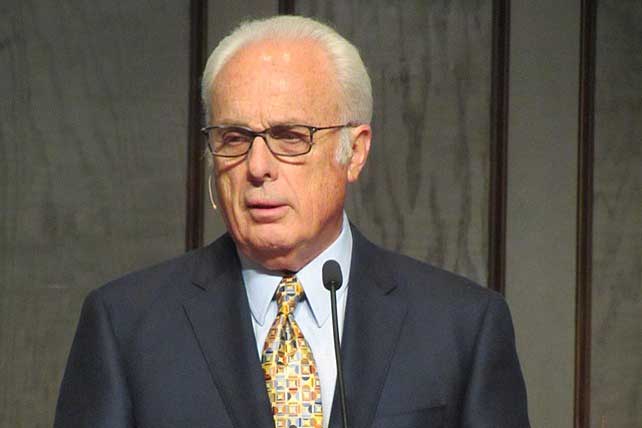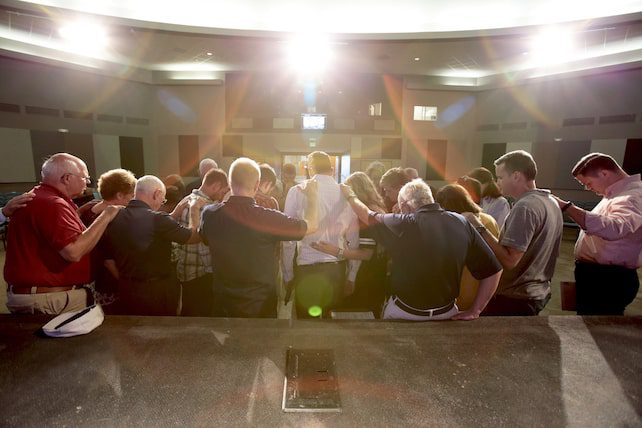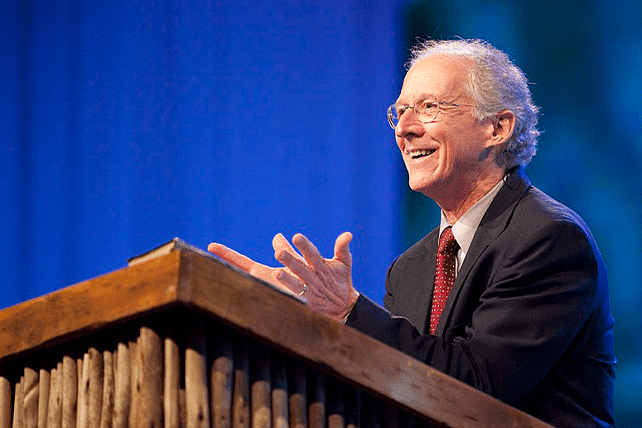Editor’s note from Ed Stetzer: As a professor, I have the privilege of reading papers submitted by some pretty sharp students, and I’ve been sharing some of them—with permission of the author/student, of course. In this case, Steve DeWitt wrote this look at John Piper that I thought I’d share with you.
While John Piper is “Christian famous,” and his influence is multidirectional, his influence on the church’s engagement in mission is easily overlooked amidst his extensive preaching, teaching, and writing ministries. This muted influence may be his longest-lasting and most globally impacting.
In this article, I will explore the missional influence of John Piper’s life and ministry.
A Condensed John Piper Bio
Dr. John Piper (1946-) is the former pastor of Bethlehem Baptist Church in Minneapolis, Minnesota (1980-2013). He is the son of an evangelist and was raised in Southern fundamentalism. He earned degrees from Wheaton College and Fuller Seminary and a doctorate from the Ludwig Maximillian University of Munich. His early career was as a professor at Bethel College and Seminary in Arden Hills, Minnesota. In 1980, he became Bethlehem Baptist Church’s Senior Pastor (Minneapolis, MN), an urban church in the Baptist General Conference (currently called Converge). Piper rose to prominence in reformed evangelicalism due primarily to affectional expositional preaching and expansive writings and publications.
The Preaching of John Piper
Piper was, first and foremost, a committed local church pastor. His global fame emerged from his weekly expositional sermons that slowly gained a hearing outside the church via the church’s media ministry (and later mega-conferences). His remarkable gift of preaching earned him preaching opportunities outside the church. One sermon in particular helped put John Piper on the missional map: his May 2000 message at the Passion Conference and its 40,000 college students. His message is known as his “Seashells” sermon, in which he decried the American dream of retiring to a beach and collecting seashells. Former executive director of Desiring God, David Mathis, says of this sermon, “When we trace the history of Desiring God and John Piper’s rise in influence over the years, One Day 2000 may be the single most significant event in terms of exposing a wider audience to Piper” (Zylstra 2017). What followed this sermon were invitations to high-profile conferences and large audience venues, which amplified Piper’s brand of Calvinistic theology and missional call to reach the nations with the gospel for God’s glory.
The emergence of John Piper’s ministry coincided with a broader movement often called the “Young, Restless, and Reformed” (an identity taken from an article and book by that name authored by Collin Hansen). Large institutions such as the Southern Baptist Convention and Southern Seminary were experiencing a resurgence in Calvinistic theology and practice. The later emergence of reformed movements and church planting efforts further popularized broadly reformed, softly charismatic, complementarian, and contemporary versions of Calvinism (i.e. Acts 29, Sovereign Grace, Redeemer City to City, and others). Arguably, John Piper was the chief theologian and spokesperson for this neo-Calvinistic church planting and church revitalizing movement (along with other notables such as Tim Keller, R.C. Sproul, and D.A. Carson).
The Writing of John Piper
While impossible to objectively measure, arguably even more impacting than Piper’s public teaching are the books he has authored and the millions of copies that have sold. These books are on a range of topics from marriage to cancer, but all are written from a thoroughgoing reformed worldview and a deeply confessional perspective. His seminal work is “Desiring God: Meditations by a Christian Hedonist” (1986). In some ways, all of Piper’s later writings echo this one. His primary contributions to missional theology will be discussed below. I note the influence of his writings as these will outlast his life and continue to promote his theology of God’s glory for decades to come.
The Ethos of John Piper
I briefly mention this dimension of Piper’s influence as it is one that those deeper in his circle note with admiration. Piper’s life habits often run counter-culturally and paradoxically strengthen his messaging. These include giving away all the royalties from his book sales (estimates are in the tens of millions of dollars), intentionally anti-materialistic lifestyle and dress, and decisions that run counter to megachurch pastor expectations (as an example, taking a year-long sabbatical in his 60s because he detected too much personal pride). While some might criticize his approach, those on church staff with him have described officing near him as “three doors down from a power plant” (Storms and Taylor 2010, 24). His “logo” is his most common preaching posture with a single hand raised in “expositional exultation.” Piper’s legacy will be one of passionate theology and ministry practice derived from a high view of God, his sovereignty, and his glory.
Piperology
If there is a core truth to John Piper’s theology and missions, it is this oft-repeated Piper phrase, “God is most glorified in us when we are most satisfied in him.” God’s glory and the glory of Christ are the touchstone truths for all other Piper teachings, missions included. Here, I will describe Piper’s theology of God’s glory in missions and assess it considering a theology of misseo Dei. His book, “Desiring God,” introduces what Piper calls “Christian Hedonism” which he develops from God’s own personal delight in Himself as the ultimate being and reality. In some ways, Piper is an aggregate theologian of the reformed faith. He draws deeply from Calvin, Edwards, Lewis, and others in the Augustinian stream and popularized them through his compelling writing and rhetoric. Central to all he writes is the glory of God, which Piper proposes is first in God’s priority and must be in ours. “The climax of God’s happiness is the delight he takes in the echoes of his excellence in the praises of his people” (Piper 1996, 32). He urges God as the final and ultimate satisfier of our spiritual longings and therefore God’s glory spread to the nations as our “battle cry” (Piper 1996, 189).
Piper’s notable influence on missions began with his chapter on missions in his book “Desiring God.” There, he points out the internal theological logic connecting God’s glory, human eternal satisfaction, and gospel mission. Full satisfaction in God glorifies God and must free us from the materialistic worldview of Western culture. Missional theology leads to missional living in which Christians happily sacrifice lesser satisfactions for greater joy and meaning in joining God in his mission to spread his fame by redeeming people from all nations. Therefore, God’s glory is worthy of our money, suffering, sacrifice, and going into the world to reach the “ethne,” with the gospel for God’s glory.
Piper’s heart for the glory of God in missions is reflected in many of his later writings, including “The Pleasures of God” (1991), “Don’t Waste your Life” (2003), “God’s Passion for His Glory” (1998), and others. His most influential writing on missions is “Let the Nations Be Glad: The Supremacy of God in Missions” (1993). This is an expansion of his chapter on missions in “Desiring God” and encapsulates both his “seashells” sermon and his theology of God’s glory. He summarizes that the proper human motivation in missions must be worship. “The goal of missions therefore is the gladness of the peoples in the greatness of God” (Piper 1996, 219). Perhaps his most quoted missional statement is, “Missions is not the ultimate goal of the church. Worship is. Missions exists because worship doesn’t. Worship is ultimate, not missions, because God is ultimate, not man” (Piper 1993, 11). This is the core of Piper’s missional theology. As God is the highest good, ultimate love for him involves a passion for his glory as well. God’s glory expands as sinners respond to God’s gracious offer of forgiveness in his gospel, thereby ascribing to God the glory due to his name. God’s mission to save is reflected in Piper’s core statement that “God is most glorified in us when we are most satisfied in him” as evangelism spreads the “satisfaction in God” thereby magnifying God and his glory.














 The Church has always played a central role in addressing human suffering, embodying the compassion and healing ministry of Christ. Today, the scientific study of mental and relational health presents an opportunity for the Church to reclaim its role as a leading provider of care for the brokenhearted. This integration of faith and science not only aligns with biblical teachings but also enriches our approach to holistic healing.
The Church has always played a central role in addressing human suffering, embodying the compassion and healing ministry of Christ. Today, the scientific study of mental and relational health presents an opportunity for the Church to reclaim its role as a leading provider of care for the brokenhearted. This integration of faith and science not only aligns with biblical teachings but also enriches our approach to holistic healing.








 What do
What do 










